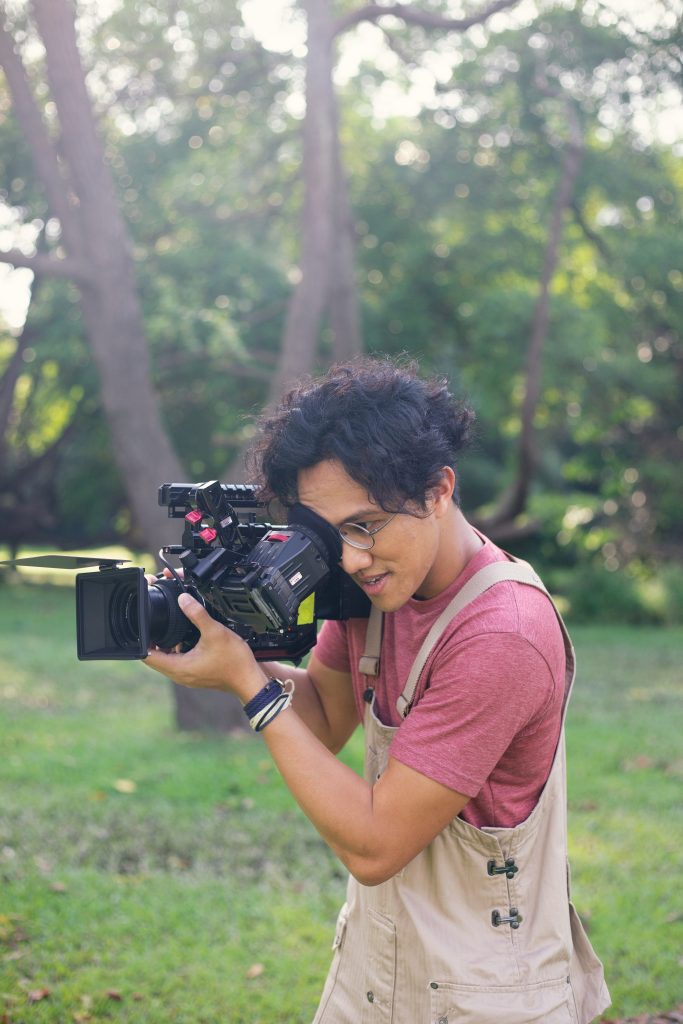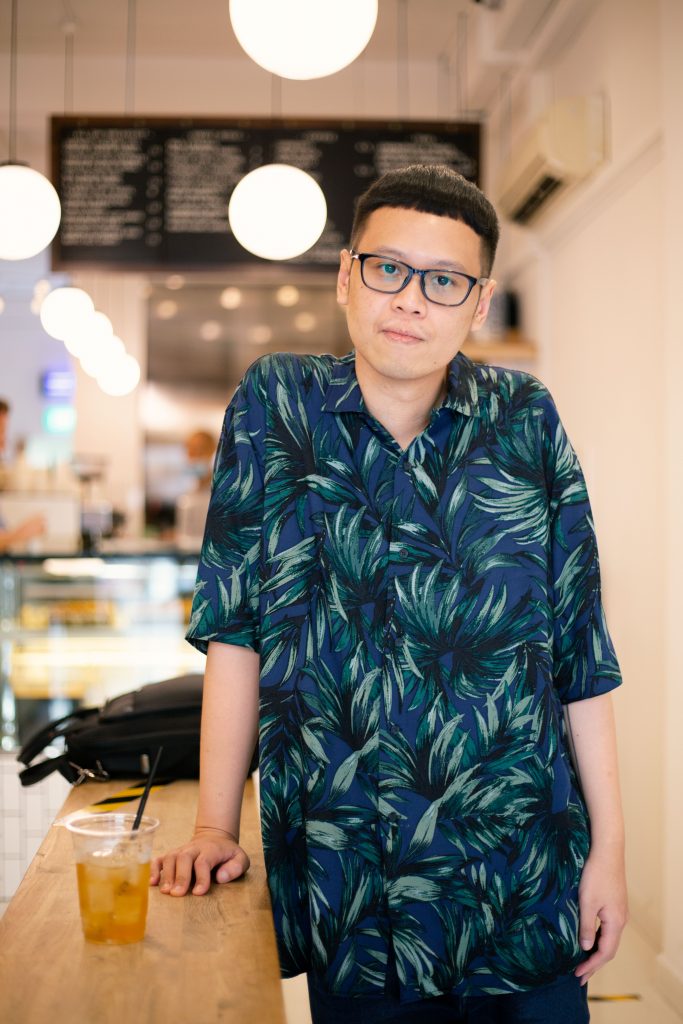This first instalment of #FacesofFilmAsia saw us speaking to a film lecturer, a director of photography, and a film critic. If film is your thing, some of these stories and insights will resonate.
Interview responses have been lightly edited for clarity.
Director Of Photography

Let me go back to those times when I travelled out of Singapore, and I would get questions like, “What is a good Singapore film should I watch?” or “How do I know what a Singaporean film looks like?”
Personally, I think we are pretty westernised in terms of our filmmaking culture and the way we tell our stories. At this present time, probably half of us grew up watching American films or tv series and the other half of us grew up watching any films/tv series they could get hold of. I think a lot of our Singapore films are generally pretty underrated internationally. Even locally, some of us rarely hear some of the films that were running at festivals or short period times in local cinemas. To me, I think one possible reason is because of the lack of marketing or accessibility, or, for international audiences, it can be hard to identify us to a particular culture, and some may even question the nationality of it.
But over the last couple of years, I think times are changing and we do see our films being out there now. We have better support and also I’ve noticed a trend of people going to cinemas catching local films as well.
What is one Singaporean/Southeast Asian film you think everyone should watch?
One Singaporean film that I truly enjoy watching, and I did watch it in Busan as well, would be Apprentice by Boo Junfeng. I think internationally we place ourselves on the map for having the death penalty. I think this film dives deep into the characters that work in that execution position and the apprentice that has to take up the bigger role of executing someone. But definitely, this is just the surface of the film. I won’t speak much of it but do catch it if you can!
How would you convince a Singaporean to watch more Singaporean/Southeast Asian films?
(Laughs) Actually, to be honest, we only watch a good film through word of mouth or reviews. Usually, I would just go to my friends and, “Eh bro, I heard this film damn good man! Wanna watch this weekend or not?”
Generally, if I were to speak to someone to catch a local or Southeast Asian film, I would definitely say how I truly feel about it and what experiences I had watching it. I think generally when I speak about the feelings I have or had for a certain film, people are curious why I felt that way, and can they actually have that feeling as well for the film? And sometimes when we start speaking about the film, people sometimes can relate to the film, and when they feel like they can, they would go for it. That’s my usual way of trying to convince people. To share my feelings about it.

I grew up with my late dad loving films. He would sit a whole day catching Bollywood to American to any foreign films. And because of that, sometimes we sat beside him and watched with him. As I grew older, I developed the love for films because it placed me in that location, in that story, in that character, in that space, in that experience, and it is a form of escapism. Films also widen our perspectives and some of them make us think deeper about the message or the story of it. I think I have become obsessed with finding that great film that I would put in my personal top 10 list.
Films also make me understand that stories are the ones that people remember more. Because of that, I travel more out of Singapore, in search of interesting stories to tell and share with friends and families. I think at the end of the day not only films changed my life but the process of finding stories and telling them made me who I am today as well.
What do your friends and family think of your love of (or obsession with) film? How does that make you feel?
I am lucky to have very supportive friends and family members who are very accepting of my love of films and filmmaking. Some would say I’m a film nerd or a filmmaking geek but I truly love that name for me.
Film Lecturer, Lasalle College Of The Arts

Ho Tzu Nyen’s Here (2009) is one of the most riveting yet underrated local films. I make it a point to screen this for film students when we discuss Singapore cinema. Ho’s film defies easy categorisation and in doing so, opens itself up to the possibilities the medium offers. Its anti-realist approach takes the audience out of the usual hypnosis of the classical narrative.
In this film, the Brechtian alienation effect comes to the fore and audience are attuned not to the emotion of characters but are stimulated to think more deeply about the processes of representation through Ho’s cinematic approaches. The invitation to draw parallels between the Island Hospital and Singapore, and seeing oneself as one of the patients, is haunting.
The Malaysian film, Sepet (2005), by the late Yasmin Ahmad, is my pick for a Southeast Asian film everyone should watch. While entertaining, it also provides a stimulating discussion on the nature of prejudice. While the title of the film at first glance may seem to reinforce stereotypes (sepet as slit eyes), it goes much deeper in its investigation of race and nationalism in Malaysia. Through the inter-racial romance between our protagonist, Orked and Jason, the film masterfully explores inter-ethnic relations and invites its audience to think about how they relate to one another within and beyond their ethnic group.
This is encapsulated in the film through Jason’s friend, Keong who initially was apprehensive about “Chinese boys should never go out with Malay girls”. After spending time with her, Keong realises that they are quite alike. He later reveals to Jason that it is not that he is biased against Malays, it was just that he never really gave them much thought because he does not socialise with them. Considering the amount, we think we know about the world, only a small percentage of that knowledge is based on the first-hand experience.
Are Singaporean/Southeast Asian films underrated? Why?
Southeast Asian films and the works of filmmakers such as Apichatpong Weerasetakul, Tran Anh Hung, Riri Riza, Mouly Surya, Kirsten Tan, Yeo Siew Hua and many more have put this region on the global cinematic stage. One cannot understate the very presence having a profound influence on aspiring filmmakers. When a film student says they wish to capture the grittiness of youth subculture as seen in Royston Tan’s 15 (2002) or explore the different cinematic forms like Apichatpong did in Uncle Boonmee (2010), one has to acknowledge the impact of these filmmakers and how they have inspired a new generation of filmmakers. While Southeast Asian films are getting much-deserved attention on the global platform, a robust local film culture solidifies homegrown cinema. We can say this seems ‘difficult’ with commercial films dominating screens but the reality today is that there are way more avenues to watch films from the region.
Asian audiences still carry an unconscious postcolonial attitude that films from the West are superior to those from Asia, and that’s where their movie ticket will go. What is exciting though is that this attitude is slowly changing.
Today, when we talk about access, one definitely has more options readily available—more venues in Singapore such as The Projector, The Arts House and also, an increasing number of film festivals to increase one’s film literacy. Sometimes, one is spoilt for choice. The committed presence of an online platform like Viddsee which started in 2013 provides massive opportunity.
First, for aspiring filmmakers to exhibit their works, and secondly, for the public to access the films. Prior to this, one struggled to locate Southeast Asian films. There really is little excuse, you are one click away from getting access to watching these films.
SGIFF’s Film Immersion programme, for example, is a great initiative to educate the younger generation about film and filmmaking. This is where one starts eradicating the mindset that films from this region are not on par with those from Europe or the United States. Film is such an essential part of life yet if one were to be exposed to one part of the world, one is missing how the other half lives. Advocates within the immediate community are equally significant and they don’t usually have to come in the form of institutions or enterprise.
There is a DVD shop I used to religiously patronise, Rida at Serene Centre. The lady who runs it, quite the personality, is a genuine film buff. That was where I was recommended Last Life in the Universe (2003)! There was also this hole-in-the-wall shop at Midpoint Orchard where I bought my first Criterion Collection DVD which was Jane Campion’s An Angel at My Table (1990). You leave these places with more than just a film.

One can choose to watch films that showcase charmed lifestyles or they can see themselves and others on the screen.
We may brush off films from Southeast Asia because we ‘think’ we know it. Yet no two films from this region are alike and on most occasion the Southeast Asia that we ‘think’ we know can be visualised in an alienating way (as did Yeo Siew Hua’s A Land Imagined (2018)) or a landscape and its people that is disappearing before our eyes (Nguyen Trinh Thi’s Letters from Panduranga (2015)). Why simply be entertained, when in the process you can be provoked and haunted? There is also so much Southeast Asia within these films to discover together.
I catch myself every now and again telling film students, don’t cross the river to fetch the water. Look not towards Hollywood but start in your own backyard or in our case, what’s happening along our corridors. What is that story waiting to be told? What is that emotion? Authenticity comes from telling stories you know. There’s still so much to be said about trusting our own voices.
As a Singaporean, how has your love for film changed your life?
When I was at university back in the late 90s and unbeknownst to my parents I switched courses from hospitality to the humanities department. I was drawn to subjects that one had to whisper back home. So not surprisingly, I quickly found my place within gender studies. The department administrator who’s a cinephile became my gateway into the world of films.
I recall her passing me two VHS tapes one day to watch. One was Dennis O’Rourke’s The Good Woman of Bangkok (1992) and the other, Trinh Minh Ha’s Re-assemblage (1982). The focus of both films were women. O’Rourke’s film was at best a post-colonial, capitalist exploitation of the filmmaker, a divorced white man who heads to Thailand and finds himself a female companion. She becomes the subject of his film. While Trinh’s film took the ethnographic approach which can sometimes be laden with exoticisation, her method took the genre to another level. How the film opens never leaves my mind. Stating her intention in the opening of the film as “Not to speak about/just speak nearby” of a group of Senegalese women, her approach contrasted O’Rourke’s.
This was my own lesson of understanding the different ways of seeing as inherently structured. These two films along with another film she got me to watch, Deepa Mehta’s Fire (1996). There’s a conversation between the two characters where the younger Sita says to her sister-in-law Radha, “Isn’t it funny? You just have to push this button, this button called ‘tradition’ and I start responding like a trained monkey. Do I shock you?” Come on, think about that dialogue, how do you not have an awakening? Mehta is a courageous filmmaker because, through characters in the Bhagavad Gita and the trial of fire, the women at the end of this narrative live! I still think the film is empowering.
These three films changed my perspective on life, and taught me the power of the medium.
What do your friends and family think of your love of (or obsession with) film? How does that make you feel?
My mother once attributed films to have negatively impacted my life (and choices). To be fair, I don’t think she could see this love for films materialising into something else beyond an obsessive activity, a frivolity and certainly, not a serious form of study. I guess I proved her wrong. I think the message here is, if you are going to be obsessive about something, do it obsessively well.
Film Critic and Writer

Apprentice by Boo Junfeng is the most underappreciated Singaporean film in my opinion. It’s certainly found acclaim among critics and at film festivals, but it’s sad that a majority of Singaporeans haven’t heard of this movie. The film follows a young Malay corrections officer named Aiman, played with gripping gravitas by Fir Rahman, as he’s mentored by Changi Prison’s chief executioner Rahim (Wan Hanafi Su). Without giving away crucial plot points, I found this film to be an unflinching, thought-provoking and humanist examination of the death penalty from the side of the hangman, and the loved ones the executed leaves behind.
This was such a sombre and sobering character drama dealing with the ethical and emotional weight of capital punishment in Singapore.
Are Singaporean/Southeast Asian films underrated? Why?
This is a tricky question. I think Singaporean films are generally underrated by local audiences, but that premise isn’t necessarily true for the rest of Southeast Asia. If you look at Indonesia or the Philippines or Thailand—their local films are very popular. Over here, occasionally you’d get a big hit like a Jack Neo slapstick comedy, or sometimes if a movie finds acclaim overseas, like Ilo Ilo for example, it’d pick up steam. But generally, I’ve found that Singaporean films aren’t a priority for local viewers who would rather watch a blockbuster from Hollywood, Bollywood or China.
There is a mentality that Singaporean-made movies are of a lower quality than those made overseas. Perhaps in terms of production value, that’s true because we simply have less financial capabilities and resources. But in terms of creativity and talent, I’d argue that there’s nothing that separates us from the rest of the world. I’m certainly not saying that all Singapore movies are great. There’s plenty of low-brow garbage made here, just like there’s plenty of low-brow garbage made everywhere. But there are plenty of world-class films made here too.

Personally, I’d just show them what Singaporean and Southeast Asian films have to offer. When I’m hanging out with my friends at home, instead of rewatching The Office for the 100th time or whatever, I’d put on a great Southeast Asian movie instead. Seeing is believing. If they’re impressed, they’ll start to rethink their biases against regional films, and they may even ask if there’s any more stuff out there like this. And hopefully, they’ll pass on the recommendation to others too.
As a Singaporean, how has your love for film changed your life?
My love of film has changed my life completely. I wouldn’t have a career if not for it. My very first job in media was as a film critic for a now-defunct pop culture website called inSing.com. On a whim, I entered a contest where you could win a Macbook if you submitted the best-written review for a particular film. I don’t even remember what the movie was now. But they liked my review so much that they hired me to write film reviews for them regularly.
These days, my love of film is still paying my bills because I do essays and film reviews for websites like Popwire and NME. I also have a podcast called Genre Equality which focuses on films as well, so it’s become a big part of my life beyond just enjoyment.
What do your friends and family think of your love of (or obsession with) film? How does that make you feel?
Those closest to me seem to enjoy my obsession with films. I don’t know if they’re humouring me or not though. But we often go see movies together, or we discuss films over dinners and hangouts. It makes for fun conversation. I’m really glad that those around me share similar interests—but if my rants about Jidaigeki or French New Wave or old silent films or Judy Garland musicals get too esoteric and overbearing, feel free to tell me to shut up guys.






